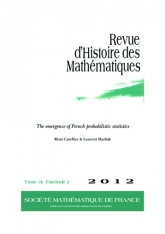L'émergence de la statistique probabiliste française. Borel et l'Institut Henri Poincaré dans les années 1920
The emergence of French probabilistic statistics. Borel and the Institut Henri Poincaré around the 1920s

- Consulter un extrait
- Année : 2012
- Fascicule : 2
- Tome : 18
- Format : Électronique
- Langue de l'ouvrage :
Anglais - Class. Math. : 01A60, 62--03; 01A74, 62G05
- Pages : 271-335
- DOI : 10.24033/rhm.174
Cet article concerne l'émergence de la Statistique mathématique moderne après la Première Guerre mondiale en France. On y présente les travaux d'Emile Borel, et notamment la création de deux institutions où la statistique mathématique se développa : l'ISUP (Institut de Statistiques de l'Université de Paris) en 1922 et surtout l'Institut Henri Poincaré (IHP) en 1928. A l'IHP, un nouveau périodique, les Annales de l'Institut Henri Poincaré, fut créé en 1931. Nous examinons les premiers articles qui y traitaient de statistique mathématique.
Statistique mathématique, Borel, Institut Henri Poincaré, estimation, cumulants

